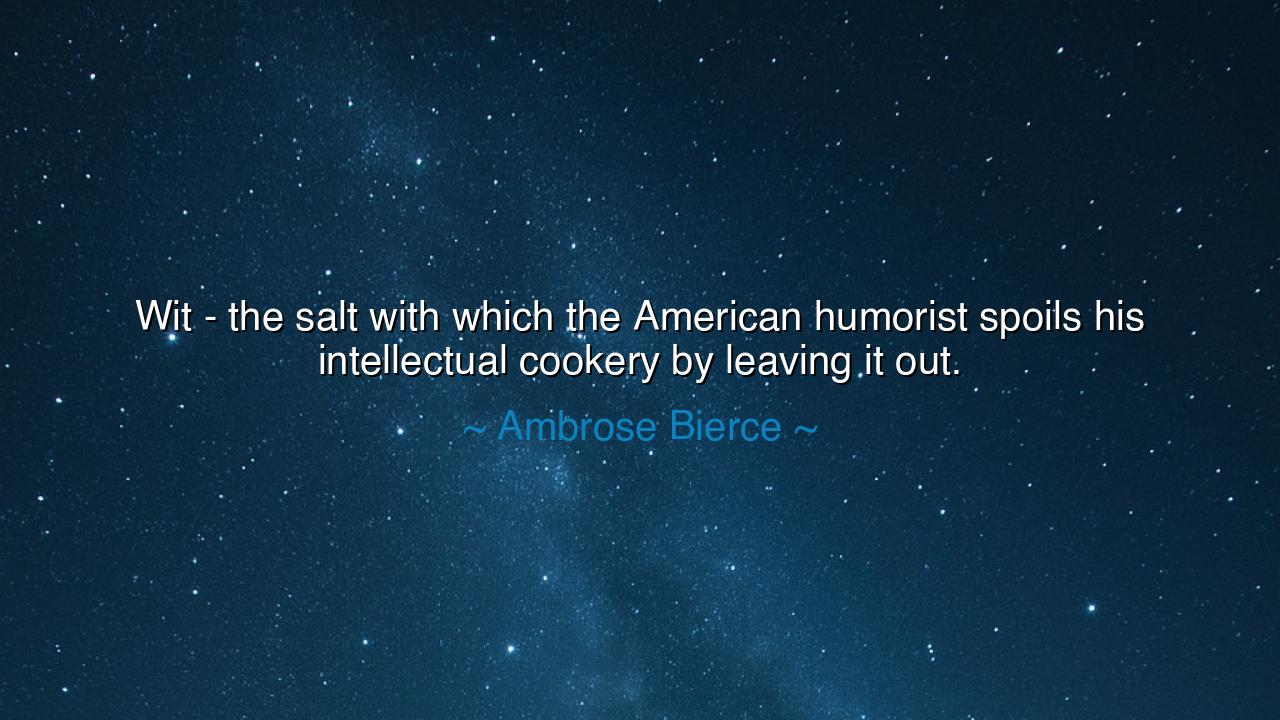
Wit - the salt with which the American humorist spoils his
Wit - the salt with which the American humorist spoils his intellectual cookery by leaving it out.






“Wit — the salt with which the American humorist spoils his intellectual cookery by leaving it out.” Thus spoke Ambrose Bierce, the master of irony, the dark satirist whose tongue was sharper than any sword. In these few words, he carved a truth both bitter and divine — that wit, that bright spark of the mind, must not be forgotten in the feast of intellect. For as salt gives savor to food, so wit gives spirit to thought; without it, even the most learned discourse lies heavy and tasteless upon the soul.
In the ancient way of teaching, the elders would say: “The tongue of wisdom is best when seasoned.” Bierce, though clothed in the garments of cynicism, spoke as one of those elders reborn in a restless age. He saw around him men and women who prized intellect, who could reason, argue, and compose, but who had forgotten the grace of laughter, the sparkle of the human mind. He saw that knowledge without humor becomes pride, and pride, left unchecked, turns the feast of the mind into a banquet of ashes.
The American humorist of Bierce’s time — like Mark Twain, his brilliant contemporary — wielded words like both sword and balm. They could cut through hypocrisy, yet also soothe the weary heart. But Bierce, the eternal skeptic, feared that his countrymen were losing that sacred balance. He mocked those who, in seeking to appear wise, became dull; who in trying to be profound, forgot to be alive. Wit, he taught, is not mere jesting — it is the lightning of understanding, the flash that reveals truth in an instant. To leave it out is to abandon the divine spark that lifts wisdom above machinery.
Consider the tale of Diogenes, the ancient Greek philosopher who carried a lantern through the streets of Athens, seeking “an honest man.” He, too, was a humorist of a sort — sharp, irreverent, and full of wit. When Alexander the Great came to him and asked what favor he desired, Diogenes replied, “Stand out of my sunlight.” In that single sentence lay a universe of wisdom: the vanity of power, the sufficiency of freedom, the smallness of man before the glory of the sun. Without wit, that truth might have been written in endless scrolls — and still missed its mark. With wit, it burned into the memory of centuries.
So it is with Bierce’s America, and with our world still. When we abandon wit, we become machines of learning — efficient but soulless. Our words may be correct, our logic flawless, but they will not move hearts. To teach, to write, to speak, or even to live without wit is to serve a feast without salt — technically perfect, yet lifeless. The great minds of all ages — Socrates, Shakespeare, Twain — understood that wit is not ornament, but essence. It is the divine laughter that carries truth safely through the storms of pride and ignorance.
Learn, then, from Bierce’s bitter wisdom: let your intellect be fierce, but let your wit temper it; let your reason be sharp, but let your laughter be kind. Do not fear humor as weakness, nor treat solemnity as proof of strength. A smile can unveil falsehood faster than a thousand arguments. And a well-placed jest, like salt in the stew, can preserve wisdom from decay.
In your own life, remember this lesson: do not serve your thoughts unseasoned. When you write, add the grace of humor; when you speak, let light dwell in your words; when you think, allow wonder and play to walk beside reason. For wit is the soul’s lightning — brief, bright, and holy. It strikes not to destroy, but to illuminate. And those who leave it out, as Bierce warned, spoil not merely their craft, but their very spirit.






AAdministratorAdministrator
Welcome, honored guests. Please leave a comment, we will respond soon